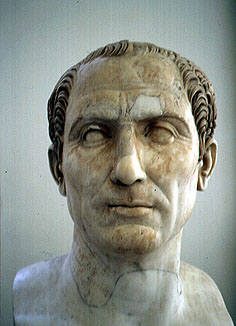

Julius Caesar was born on July 12 or 13, 100 B.C. He was a member of the prestigious Julian family that was always in the middle of controversy. Caesar himself was often called a radical. He knew how to play the system and was very involved politically throughout his life. He was also a very shrewd military leader and led many troops to victory throughout his famous career, using his famous line, "Veni, vidi, vici" (I came, I saw, I conquered) .
ACHIEVEMENTS:
In 48 B.C. Caesar became dictator of Rome.
In 45 B.C. Caesar was made consul. While consul, he made trips to Africa, Asia Minor, and Europe. He recorded the geography, astrological data, and commented on almost all the land he touched. Later he used the title of imperator and wore a robe, crown, and carried a scepter.
As a ruler Caesar did some good things for his people, such as eliminating the corrupt tax system, sponsoring colonies of veterans. He also reformed the calendar which became known as the Julian Calendar with 365 days in a year with an extra day every four years. He established law and order throughout the country and set up local authorities, or municipia, that compare to today's local government authorities.
GIFTED WRITER:
Caesar wrote military history, somewhat slighted, but nevertheless terrific prose detailing the events of the Gallic Wars, the Roman Civil Wars and the crossing the Rubicon. During his military mission, he conquered Gaul (France) and invaded the southeastern part of Britain. He wrote stories about these attacks and was given credit for being a fine writer as well as an excellent leader.
His De Bello Gallico (Commentaries about the Gallic War) is considered one of the great books of Latin literature. In this book he spoke of himself in the third person, which seems to give the work a feeling of objectivity and impartiality, but obviously it is likely to be one-sided. It is written in a straight forward and direct manner. There are short descriptions of battle scenes, of heroic members of the infantry, and his strategies. Nevertheless, it is interesting to read how he often took his enemy by surprise. It is also sometimes shocking to read how, in order to put fear into his enemies, he slaughtered whole villages or sold his captives into slavery. (Slave traders often followed the armies just for this purpose.)
As a prose writer, Caesar is compared as second only to Cicero.
DEATH:
Unfortunately, many did not agree with his politics. They felt he might become Rex (king). In 44 B.C. an assassination plot was formed by a group of senators who included Cassius and Brutus. On March 15, Caesar was killed at the Theater of Pompey. He was stabbed 23 times. That day is now referred to as the "Ides of March."
Written by Rusty and Josh